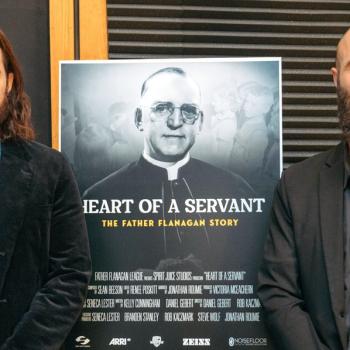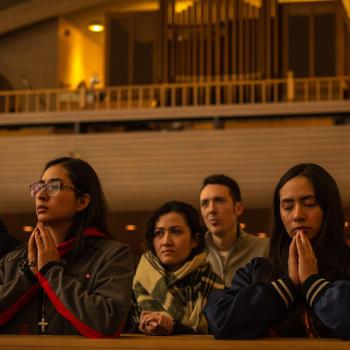Lectionary Reflections
Mark 6:30-44
July 22, 2012
Booker T. Washington (1856-1915), the great African American educator, author, orator, and advisor to presidents, was fond of telling this story:
A ship, lost at sea in the Atlantic Ocean along the northern coast of South America for many days, suddenly sighted a friendly vessel. From the mast of the unfortunate vessel came the signals: "Water, water. We die of thirst." The answer from the friendly vessel came back at once: "Cast down your bucket where you are." A second time, the signal: "Water, send us water!" from the distressed vessel. And was answered again: "Cast down your bucket where you are." A third and fourth signal for water was again answered: "Cast down your bucket where you are." The captain of the distressed vessel, at last heeding the injunction, cast down his bucket. It came up full of fresh, sparkling water from the mouth of the Amazon River, which extends miles out into the ocean in what is called the "River Sea."
In this story a ship full of people had an urgent need for fresh water, and it was closer at hand than they knew. Our text this week overflows with needs as well.
A need for rest:
The apostles need rest (Mk. 6:31). They are worn out with the demands of their lives and the needs of others. They apparently had some food to share, but not even time to eat it because of the crowds teeming around Jesus (v. 31). It is likely that Jesus recently had learned of the death of his cousin John. Grieving people need rest and refreshment.
A need for leadership:
Never mind Jesus' needs and the apostles' fatigue, the crowds needed a teacher to guide them. Mark tells us that Jesus had compassion on the people because they were "like sheep without a shepherd" (Mk. 6:34). I've always found that verse very moving as Jesus, despite his grief and fatigue, is energized to meet the needs of the crowds around him by the deep compassion he feels for them.
A need for food:
The disciples notice that it's getting late and the people are hungry. They come to Jesus to get him to give the benediction and get the crowd on its way (and out of their way). "Send them away so that they may go into the surrounding country and villages and buy something for themselves to eat" (v. 36). I don't get the idea that this crowd has that kind of money, but the disciples don't seem to care about that as long as they evacuate the premises. Essentially, the disciples responded, "Send them away. They are not our responsibility." Apparently, they don't have the same compassion reflex of Jesus when they look out over the crowd. Jesus sees needs that God can meet. The disciples see obligation that they seek to avoid.
This scene contrasts with the many church suppers I've attended over the years. I've lived in Texas for thirteen years, and a church member who owns the local barbecue restaurant often caters the meal here. There is a table filled with beef, turkey, potato salad, rolls, coleslaw, and peach cobbler with Bluebell vanilla ice cream. When I served churches in Pennsylvania, there would be a table groaning under the weight of the specialties of the ladies of the congregation, from macaroni and cheese to marshmallow fruit salad. The pastor or emcee of the event would give the instructions: "After an opening prayer, we'll begin with the table on my right and go through the buffet."
There are key differences between these church suppers and Jesus' version of a church supper in Mark 6. First, nobody brought much of anything. Hence Jesus' orders to his disciples "You give them something to eat" (v. 37). At his orders, the disciples scout out the resources in the crowd. They are meager: Five loaves and two fish, wrapped in paper, pulled out of the pockets of a couple of cloaks. Jesus' version of "Let's begin with the table on my right and each table go to the buffet" is "Sit down in groups of hundreds and fifties" (v. 39). He then looks up to heaven and, in a manner reminiscent of the Eucharist, blesses and breaks the five loaves of bread and divides up the two fish.
Part of the message of the passage may be that we may have a few crusts of bread in our pockets we hadn't remembered were there. In other words, there may be more resources in a given situation than we realize. Joni Mitchell warbled that insight in her classic, 1970 song "Big Yellow Taxi."
Don't it always seem to go,
that you don't know what you've got till it's gone.
You pave paradise and put up a parking lot.
She's right. Sometimes we underestimate other's value and contributions only to realize them after the fact. We consign elderly relatives to the "has been" bin, not realizing the rich resource of wisdom their stories can yield for us and ours. We dismiss our current circumstances, thinking the grass will always be greener in another place, job, relationship, or church. Perhaps we underestimate our gifts and ourselves. But what if, within the confines of our situations, within the gifts and abilities of people around us, within our own life stories and buried family heritage, there were untold riches, untapped resources of wisdom, energy, and inspiration? Then, the message of this passage would be "Cast down your buckets where you are" and find human resources you didn't realize were there.





